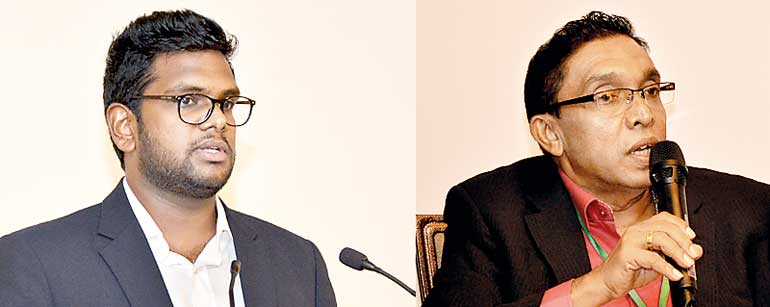Tuesday Feb 24, 2026
Tuesday Feb 24, 2026
Tuesday, 15 November 2016 00:22 - - {{hitsCtrl.values.hits}}
By Uditha Jayasinghe
Creating and curating a comprehensive ecommerce platform, taxes on financial services and clarity on landownership by foreign investors are three segments that were highlighted as needing further engagement from the Government with stakeholders on Budget 2017.
Participating at the post-Budget seminar organised jointly by Reuters and the Sri Lanka Forex Association, Ceylon Chamber of Commerce Chief Economist Anushka Wijesinha pointed out that the Government had made a slew of progressive proposals, especially on education and primary industries.
“These are my personal views but I think the focus on education and primary industries such as agriculture have been very positive in this Budget. On agriculture the focus is making farmers become entrepreneurs rather than just giving them handouts, which was what we saw in previous Budgets,” he told the gathering, which also included Finance Minister Ravi Karunanayake and prominent Colombo University Economist Dr. Sirimal Abeyratne.
 Ceylon Chamber of Commerce Chief Economist Anushka Wijesinha (R) University of Colombo Professor of Economics Prof. Sirimal Abeyratne (L)
Ceylon Chamber of Commerce Chief Economist Anushka Wijesinha (R) University of Colombo Professor of Economics Prof. Sirimal Abeyratne (L)
On education, the proposal to give scholarships to students who have minimum requirements to enter a local university but cannot do so due to a lack of space was praised by Wijesinha, who also called on the Government to expand the program as it would give opportunities to arguably some of the smartest minds produced by the school system.
Nonetheless, Wijesinha was critical of several other policies urging officials to study the impact of financial taxes so that it would not have a negative and even systemic impact on the industry.
“There is also a contradiction in the telecom policy because the Government has clearly stated that it wants to digitalise the economy but has increased taxes on data and other charges while at the same time increasing allocations to the Digital Telecommunications Ministry. There should be more coherence between tax policies and aspirations,” he said.
The economist also called for clarity on rules that foreign investors have to follow, particularly on land ownership, suggesting that the latest proposal in Budget 2017 to put a limit of 150 jobs would dull the interest of companies eyeing Sri Lanka.
“Many investors are interested in services-related investment, which may not have the capacity to generate 150 jobs. So this policy could be regressive in terms of implementation and I urge the Government to relook at this policy as well as provide clarity on foreign investment regulations as a whole.”
Proposals in Budget 2017 to establish one platform for ecommerce, especially for travel industry-related websites, should be implemented with strong stakeholder engagement as any one-sided decision by the Government could cause companies to pull out, thereby reducing business to a major sector. Charge levying on this front has to be done with attention to detail and in accordance with international practices as online booking sites and others could easily be discouraged, experts noted.
Dr. Sirimal Abeyratne was cautious of Budget 2017 being successfully implemented as the revenue targets are predicated on Sri Lanka growing at 6% even though the International Monetary Fund (IMF) and other organisations have predicted a slower 5% growth.
“Sri Lanka has just two years to implement reforms and achieve higher growth because from 2019 onwards the Government would have to face significant debt repayments. So economic management must be the top priority of the Government,” he noted.